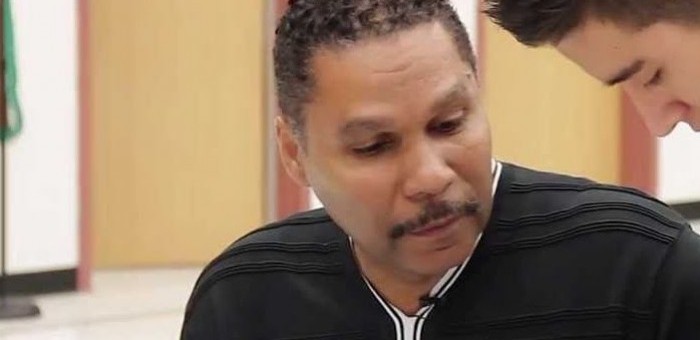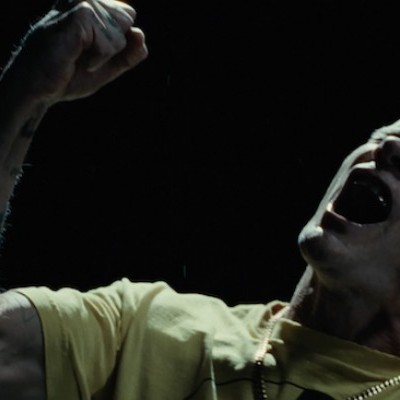Dec 9, 2025 12:28 PM
In Memoriam: Gordon Goodwin, 1954–2025
Gordon Goodwin, an award-winning saxophonist, pianist, bandleader, composer and arranger, died Dec. 8 in Los Angeles.…

José Antonio Diaz (left) leads a workshop at the Diaz Music Institute in Houston, Texas.
(Photo: Courtesy Diaz Music Institute)Judging from the flood-related atrocities in New Orleans (Hurricane Katrina in 2005) and Baton Rouge, Louisiana (an unnamed storm that deluged the city last August), it could be months and possibly even years before officials can assess the full impact of Hurricane Harvey’s toll on Houston.
In the city and surrounding regions in Texas and western Louisiana, more than 70 people were killed and over 1 million displaced by the Category 4 hurricane’s rainfall, which began on Aug. 25 and continued for several days, with up to several feet of rain destroying homes and businesses.
While news media have covered many aspects of this natural disaster, few have talked about the impact it has had on musicians. In the worlds of jazz, blues and roots music, Houston has been an important incubator, bringing us jazz stars such as Jason Moran, Robert Glasper, Kendrick Scott, Eric Harland and Helen Sung.
But what about the new crop of music professionals? While some clubs presenting jazz have been spared by the storm, many venues have been shuttered because of the damage. To make matters worse, the flood waters rose so quickly that many musicians who evacuated had to leave their instruments and equipment behind.
Immediately after the storm, José Antonio Diaz, the director of bands at MacArthur Senior High School in Houston, worried about how the flooding might impact his students. He got an indication of the scope of the damage when MacArthur opened its school doors on Sept. 5. “I sent out a huge email to present and former students to see how they were as a result of the storm,” said the 56-year-old educator, who has served as MacArthur’s band director since 1993 and founded the nonprofit Diaz Music Institute in 2006. “I heard from 60 percent of the students, most of whom had extensive flooding and some were completely out of power. It was kind of like a roll call.”
MacArthur is a Title 1 school that works with at-risk, low-income children, and many of its students come from surrounding areas that were severely flooded. “My house and community had no major flooding, and the school was on higher ground and got a minimal amount of flood water,” said Diaz, who in 2014 was inducted into the DownBeat Jazz Education Hall of Fame. “But the community surrounding the school had extensive damage because of the water, which ranged from a couple of inches to a couple of feet. We’ll have to wait until after the flood waters have receded, but my guess is that these kids lost everything.”
Despite the setback, Diaz has found a way to stay optimistic. A lot of his students, he said, had moved on to do extremely well in the music community as professionals. “I know that once you inspire students, they will absolutely believe anything is possible,” Diaz said. “It’s like you have nothing to lose. They started moving forward and didn’t look back. I grew up in Chicago, so I know music education was my way out. It changed who I was. That’s what I’m trying to help my students realize.”
In the aftermath of Harvey, Diaz is concerned about musicians being able to find work and cope with not only being without instruments but also possibly being homeless. He mentioned that music venues and recording studios had been destroyed.
Wendy Oxenhorn, executive director of the New York-based nonprofit organization Jazz Foundation of America, played an important role in aiding musicians in New Orleans after Katrina, as well as musicians in Baton Rouge after its historic deluge and the New York Community after Hurricane Sandy. She has a deep understanding of the challenges musicians face in the wake of a natural disaster.
“It will mean replacing gigs they had so they can pay rent; for musicians who have lost instruments, it means replacing them,” Oxenhorn said. “In Houston, we’ve been in touch with a Grammy-nominated musician/producer who had a studio that was used to record all the blues legends. He told me it looks like he just lost his Hammond B-3 [organ]. We just talked to another musician whose roof collapsed.”
As of this past weekend, more than 150 musicians had reached out to the JFA requesting help. “We’re hearing that all they’ve owned has been washed away,” Oxenhorn said. “That alone will take its toll, but we need a whole different set of funding to put them back to work and replace the work they had so that they can pay their rent and feed their families.”
In the past, JFA has helped to pay mortgages and rents, replace instruments, repair cars and buy clothing and mattresses for musicians and their families. JFA has also paid for bio-washings of homes to rid them of bacteria and waste. “You need to do that so that when they rebuild, they’re not putting drywall over what will become a death trap of toxic bacteria and mold,” she explained.
That kind of clear foresight is one of the many reasons JFA remains a premiere aid organization for musicians in the United States. Another is that JFA’s social workers keep in close contact with the people they help to get back on their feet. But for victims of Harvey, that contact bore out some heartbreaking news: Joseph Petrucelli, JFA co-executive director, said, “We are hearing about musicians who were displaced by Katrina, settled in Houston and rebuilt their lives, only to have their new homes damaged by Harvey. Devastating.”
The near future is grim, Oxenhorn said. “This flood will take weeks and months, and if it’s anything like Katrina, it will take a year and a half to two years for people to begin to see the priorities, [assess] what they lost, to deal with the homes, to help them build back, to help them get furniture, mattresses and clothes for their children and themselves.”
JFA and organizations like it may soon find their resources stretched thin as they consider stepping in to aid potential victims of Hurricane Irma, the category 5 storm currently thrashing in the Caribbean and projected to hit Florida.
As for the recovery in Houston, Oxenhorn remains confident in the organization’s abilities despite the magnitude of the task. “We have been working since Day 1 identifying people and speaking with them. Considering this is the fourth major disaster we have worked on, I can sadly say that we are getting pretty good at this. But this flood, because there were so many people and [Houston] is the fourth largest city in America, it’s a bit unfathomable to even think about all the people that were affected and the amount of recovery it will take.”
Citing data from the Texas Department of Public Safety, the Sept. 3 broadcast of CBS Sunday Morning reported that 6,800 homes had been destroyed and more than 84,000 damaged. Citing data from Moody’s Analytics, the same broadcast reported that the estimated cost for Harvey’s damage and cleanup would be between $40 and $75 billion.
The motto of the Jazz Foundation of America is “Saving jazz and blues … one musician at a time.” To make a donation to JFA, visit its website.
To read a Music Inc. article on the impact that Harvey has had on instrument retailers in the Houston area, click here. DB

Goodwin was one of the most acclaimed, successful and influential jazz musicians of his generation.
Dec 9, 2025 12:28 PM
Gordon Goodwin, an award-winning saxophonist, pianist, bandleader, composer and arranger, died Dec. 8 in Los Angeles.…

Belá Fleck during an interview with Fredrika Whitfield on CNN.
Jan 13, 2026 2:09 PM
The fallout from the renaming of the John F. Kennedy Center for the Performing Arts to include President Donald…

Flea has returned to his first instrument — the trumpet — and assembled a dream band of jazz musicians to record a new album.
Dec 2, 2025 2:01 AM
After a nearly five-decade career as one of his generation’s defining rock bassists, Flea has returned to his first…

The success of Oregon’s first album, 1971’s Music Of Another Present Era, allowed Towner to establish a solo career.
Jan 19, 2026 5:02 PM
Ralph Towner, a guitarist and composer who blended multiple genres, including jazz — and throughout them all remained…

Dec 11, 2025 11:00 AM
DownBeat presents a complete list of the 4-, 4½- and 5-star albums from 2025 in one convenient package. It’s a great…